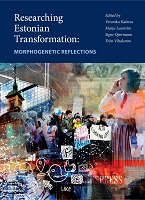Researching Estonian Transformation
Morphogenetic Reflections
Contributor(s)
Kalmus, Veronika (editor)
Lauristin, Marju (editor)
Opermann, Signe (editor)
Vihalemm, Triin (editor)
Language
EnglishAbstract
This collective monograph offers a reflexive review of the transformations in Estonian society, particularly by using the lens of social morphogenetic analysis developed by Margaret Archer and her co-workers. Based on empirical data from the 5-wave representative survey “Me. The World. The Media”, research synthesised in this book focuses on the outcomes of complex changes after the collapse of the Soviet Union and the restoration of the independent state of Estonia. In almost three decades, the authors have had a chance to observe and analyse the so-called “historical experiment” that took place in the North-Eastern part of Europe – political and economic transition, technological transformation, and digitalisation. The analysis covers the main topics of people’s life-worlds (socio-economic conditions, civic and political participation, culture, media, environment, consumption, lifestyles, time use, identities, etc.) and attitudes towards a rapidly changing society (perceived risks and benefits). The book aims to re-conceptualise the main results of the empirical studies from the last two decades by synthesising different theoretical perspectives on social change and transformation.
Keywords
social transformation; morphogenetic analysis; social acceleration; social time; social space; structuration; agency; social differentiation; social generations; EstoniaISBN
9789949033348Publisher
University of Tartu PressPublication date and place
Tartu, 2020Grantor
Classification
Society and culture: general
Media studies
Estonia


 Download
Download